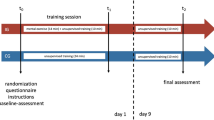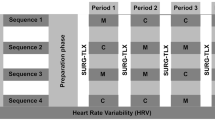Abstract
Background
Mental training (MT) is used extensively by musicians and athletes to improve their performance. Recently, it has been suggested as a training method for surgical trainees. We assessed the influence of MT, induced by hypnosis, on the performance of simulated tasks on a laparoscopic simulator, as compared to a non-specific relaxing intervention.
Methods
11 surgeons completed a proficiency-based training program on the Fundamentals of Laparoscopic Surgery (FLS) simulator, until they reached performance plateau of the peg transfer task. Thereafter, they received a single music session, as a relaxing intervention, followed by repeating of the peg transfer task. Then they went through a hypnosis session guided by an experienced psychologist, with suggestions of smooth flow of pegs from one position on the board to another, and re-performed the task.
Results
Plateau performance was 51.1 ± 6.9 s. After the music session performance improved by 6.3 % to 47.9 ± 5.4 s (p = 0.86). After the MT session performance further improved by 15.3 % to 40.1 ± 5.8 s (p = 0.009), which was a 21.6 % improvement from baseline (p < 0.001). Subject’s satisfaction from their performance, without knowledge of the task scores, was 6.0 ± 2.9 on 0–10 VAS after the music and reached as high as 8.5 ± 1.7 after the hypnotic session (p = 0.01).
Conclusions
Hypnosis-induced MT significantly improves performance on the FLS simulator, which cannot be attributed to its relaxing qualities alone. This study contributes evidence to the effectiveness of MT in surgical skills acquisition and suggests that hypnotic techniques should be used in mental preparation processes. There is a need to further study these effects on operating room performance.
Similar content being viewed by others
References
Jacobson E (1931) Electrical measurement of neuromuscular states during mental activities. Am J Physiol 43:122–125
Fery YA, Morizot P (2000) Kinesthetic and visual image in modeling closed motor skills: the example of the tennis serve. Percept Mot Skills 90(3 Pt 1):707–722
Murphy SM (1994) Imagery interventions in sport. Med Sci Sports Exerc 26(4):486–494
Groslambert A, Candau R, Grappe F, Dugue B, Rouillon JD (2003) Effects of autogenic and imagery training on the shooting performance in biathlon. Res Q Exerc Sport 74(3):337–341
NIH state-of-the-science statement on management of the clinically inapparent adrenal mass (“incidentaloma”). NIH Consens State Sci Statements. 2002 Feb 4-6;19(2):1-25.
Barker J, Jones M, Greenlees I (2010) Assessing the immediate and maintained effects of hypnosis on self-efficacy and soccer wall-volley performance. J Sport Exerc Psychol 32(2):243–252
Cyna AM, Tomkins D, Maddock T, Barker D (2007) Brief hypnosis for severe needle phobia using switch-wire imagery in a 5-year old. Paediatr Anaesth 17(8):800–804
Hansen E, Bejenke C (2010) Negative and positive suggestions in anaesthesia : improved communication with anxious surgical patients. Anaesthesist 59(3):199–202, 4–6, 8–9
Varga K (2013) Suggestive techniques connected to medical interventions. Interv Med Appl Sci 5(3):95–100
Derossis AM, Fried GM, Abrahamowicz M, Sigman HH, Barkun JS, Meakins JL (1998) Development of a model for training and evaluation of laparoscopic skills. Am J Surg 175(6):482–487
Fried GM, Feldman LS, Vassiliou MC, Fraser SA, Stanbridge D, Ghitulescu G et al (2004) Proving the value of simulation in laparoscopic surgery. Ann Surg 240(3):518–525
Ritter EM, Scott DJ (2007) Design of a proficiency-based skills training curriculum for the Fundamentals of Laparoscopic Surgery. Surg Innov 14(2):107–112
Sroka G, Feldman LS, Vassiliou MC, Kaneva PA, Fayez R, Fried GM (2010) Fundamentals of laparoscopic surgery simulator training to proficiency improves laparoscopic performance in the operating room—a randomized controlled trial. Am J Surg 199(1):115–120
Vassiliou MC, Feldman LS, Andrew CG, Bergman S, Leffondre K, Stanbridge D et al (2005) A global assessment tool for evaluation of intraoperative laparoscopic skills. Am J Surg 190(1):107–113
Immenroth M, Burger T, Brenner J, Nagelschmidt M, Eberspacher H, Troidl H (2007) Mental training in surgical education: a randomized controlled trial. Ann Surg 245(3):385–391
Sanders CW, Sadoski M, Bramson R, Wiprud R, Van Walsum K (2004) Comparing the effects of physical practice and mental imagery rehearsal on learning basic surgical skills by medical students. Am J Obstet Gynecol 191(5):1811–1814
Komesu Y, Urwitz-Lane R, Ozel B, Lukban J, Kahn M, Muir T et al (2009) Does mental imagery prior to cystoscopy make a difference? A randomized controlled trial. Am J Obstet Gynecol 201(2):218 e1-9
Marcus H, Vakharia V, Kirkman MA, Murphy M, Nandi D (2013) Practice makes perfect? The role of simulation-based deliberate practice and script-based mental rehearsal in the acquisition and maintenance of operative neurosurgical skills. Neurosurgery 72(Suppl 1):124–130
Arora S, Aggarwal R, Moran A, Sirimanna P, Crochet P, Darzi A et al (2011) Mental practice: effective stress management training for novice surgeons. J Am Coll Surg 212(2):225–233
Arora S, Aggarwal R, Sirimanna P, Moran A, Grantcharov T, Kneebone R et al (2011) Mental practice enhances surgical technical skills: a randomized controlled study. Ann Surg 253(2):265–270
Arora S, Aggarwal R, Sevdalis N, Moran A, Sirimanna P, Kneebone R et al (2010) Development and validation of mental practice as a training strategy for laparoscopic surgery. Surg Endosc 24(1):179–187
Cumming J, Olphin T, Law M (2007) Self-reported psychological states and physiological responses to different types of motivational general imagery. J Sport Exerc Psychol 29(5):629–644
Jungmann F, Gockel I, Hecht H, Kuhr K, Rasanen J, Sihvo E et al (2011) Impact of perceptual ability and mental imagery training on simulated laparoscopic knot-tying in surgical novices using a Nissen fundoplication model. Scand J Surg 100(2):78–85
Geoffrion R, Gebhart J, Dooley Y, Bent A, Dandolu V, Meeks R et al (2012) The mind’s scalpel in surgical education: a randomised controlled trial of mental imagery. BJOG 119(9):1040–1048
Spruit EN, Band GP, Hamming JF, Ridderinkhof KR (2013) Optimal training design for procedural motor skills: a review and application to laparoscopic surgery. Psychol Res 1–14. doi:10.1007/s00426-013-0525-5
Cocks M, Moulton CA, Luu S, Cil T (2014) What surgeons can learn from athletes: mental practice in sports and surgery. J Surg Educ 71(2):262–269
Wetzel CM, Black SA, Hanna GB, Athanasiou T, Kneebone RL, Nestel D et al (2010) The effects of stress and coping on surgical performance during simulations. Ann Surg 251(1):171–176
Wetzel CM, George A, Hanna GB, Athanasiou T, Black SA, Kneebone RL et al (2011) Stress management training for surgeons—a randomized, controlled, intervention study. Ann Surg 253(3):488–494
Reznick RK, MacRae H (2006) Teaching surgical skills—changes in the wind. N Engl J Med 355(25):2664–2669
Disclosures
Drs. Sroka, Arnon, Laniado, Schiff, and Matter have no conflicts of interest or financial ties to disclose.
Author information
Authors and Affiliations
Corresponding author
Rights and permissions
About this article
Cite this article
Sroka, G., Arnon, Z., Laniado, M. et al. Hypnosis-induced mental training improves performance on the Fundamentals of Laparoscopic Surgery (FLS) simulator. Surg Endosc 29, 1024–1029 (2015). https://doi.org/10.1007/s00464-014-3786-1
Received:
Accepted:
Published:
Issue Date:
DOI: https://doi.org/10.1007/s00464-014-3786-1




